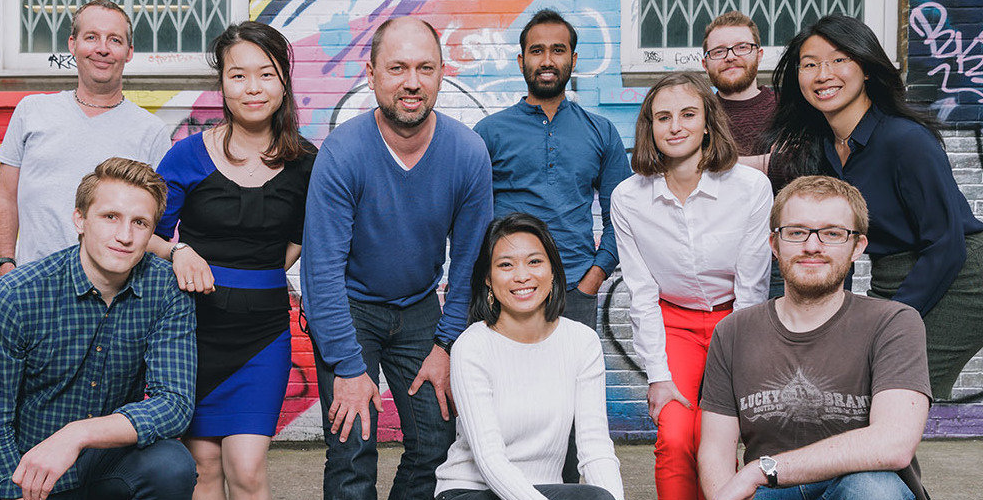We have amassed a database of over 60 million research papers and patents, and their network of expert academic curators and artificial intelligence learning software collates this latest research into easily-digestible summaries and personalised pinboards for their users. This means democratising science for everyone.
I had the pleasure to interview Dr. Vivian Chan, Co-founder & CEO of Sparrho
Thank you so much for joining us Vivian. Can you tell us the story that brought you to this career path?
I’m a self-described ‘learning geek’. Having worked in venture capital after my Bachelors in Drug Design and Development at the University of Queensland, I was awarded Cambridge Commonwealth Scholarship to complete a PhD in protein crystallography at the University of Cambridge.
Whilst at Cambridge, I was voted into the role of president of the Cambridge University Technology & Enterprise Club (CUTEC) from 2010–2011, and I was still in this role when I was approached by Alice Bentinck and Matthew Clifford of Entrepreneur First, who were seeking to recruit the nation’s top 30 graduates with entrepreneurship ambition. This was where I met my co-founder Niluka Satharasinghe, an experienced startup founder with a background in machine learning from the University of Oxford.
We founded Sparrho in 2013 to solve the problem of staying up to date with scientific literature in an increasingly multidisciplinary world. Inspiration for Sparrho came from Steve, a postdoctoral researcher in my research lab who would scan through a wide range of sources and bring personalised reading recommendations to each lab member every morning. When I described this problem to Nilu, he suggested ‘digitising Steve’. Sparrho has since evolved into a global platform that combines artificial and human intelligence to help research professionals and layman users alike discover the science that matters to them. As of 2017, we have raised a total of $3 million of funding, and Sparrho was selected as Consumer Product of the Year at the National Technology Awards in 2018.
Given Sparrho’s vision and mission, I’ve had the opportunity to address the EU Ministers of Research and Innovation about Open Science on multiple occasions, and I sit on the UK Department for Digital, Culture, Media and Sport’s Digital Economy Advisory Group.
I’ve also had the honour of being named in the MIT Tech Review’s 35 Under 35 Innovators in 2017, and the Top 5 Asian Stars in UK Tech in 2018. Previously, I was selected as a semifinalist for The Duke of York New Entrepreneur Of The Year Award in 2014 and one of Management Today’s 35 Women Under 35 in 2015.
Can you tell us about the “bleeding edge” projects you are working on right now that might change the world?
Sparrho combines Artificial Intelligence with expert curation to ensure the cutting edge is as sharp and immediate as ever
If the cutting edge is the realm of sci-fi — a future so confounding in its vast progress that it seems fictional — research is the blade that backs it. Without scientific research to push development, there would be no 3D-printed organs, no augmented reality, and certainly no digital device on which to read this on.
This is where we come in.
We have amassed a database of over 60 million research papers and patents, and their network of expert academic curators and artificial intelligence learning software collates this latest research into easily-digestible summaries and personalised pinboards for their users. This means democratising science for everyone.
Taxpayers fund huge amounts of research every year and yet many of these same taxpayers still lack access to the findings. In the UK alone the government has committed £26.3 billion for scientific research from 2016–2020, while in America the figure reaches over $44 billion. Yet, a professional content consumer, like doctors and healthcare providers, spends 195+ hours per year to stay on top of the latest developments, driving 57% of these users to request more information through digital channels. Meanwhile, the producers of the research — such as pharma companies — spend in excess of $1 billion per year on research that shows no clear return.
Through this digital platform, this hierarchical barrier between research-driven companies and researchers is broken. Expert communities can proliferate and feedback between researchers and funders creates an environment rich in innovation.
Sparrho was originally conceived in 2013 to combat information overload, as a much-needed tool for researchers to easily stay on top of new papers across all disciplines and publishers. Its co-founders, Vivian Chan (PhD in Biochemistry, Cambridge) and Niluka Satharasinghe (Machine Learning at Oxford), applied their insight into information-seeking behaviours of various scientists.

The Sparrho platform already now extends throughout 150 countries, covering over 400,000 active monthly visitors who are benefiting from this simplified access to the latest research.
If scientific research is to continue moving with the increasingly fast pace of the world, it must be democratised to the public that needs it — and Sparrho’s use of machine-learning is making this a reality. Without the double-sided use of new technologies in the creation of new products, we risk the cutting-edge becoming a blunt, elitist instrument.
The Future is Now: “Democratising science for everyone” With Dr. Vivian Chan and Fotis Georgiadis was originally published in Authority Magazine on Medium, where people are continuing the conversation by highlighting and responding to this story.



